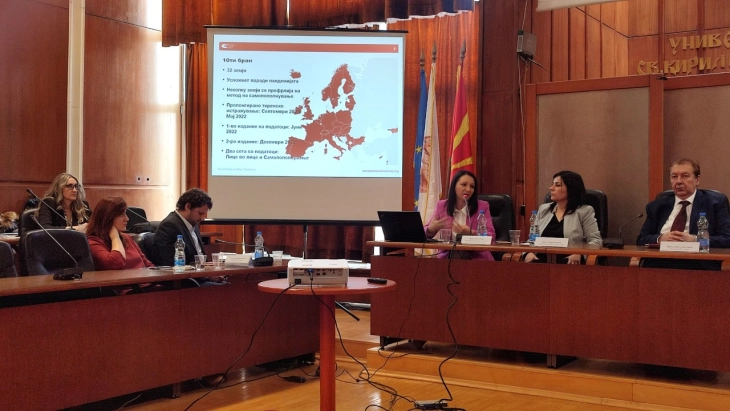North Macedonia participates in European Social Survey for the first time
- The Institute for Sociological, Political and Juridical Research (ISPPI) presented the national and comparative results from the 10th round of the European Social Survey (ESS) on Tuesday, which is a comparative survey research carried out for the first time in North Macedonia.
- Post By Nevenka Nikolik
- 14:13, 14 March, 2023

Skopje, 14 March 2023 (MIA) – The Institute for Sociological, Political and Juridical Research (ISPPI) presented the national and comparative results from the 10th round of the European Social Survey (ESS) on Tuesday, which is a comparative survey research carried out for the first time in North Macedonia.
The research is carried out biannually in more than 35 European countries. It covers a wide variety of social and political topics relevant in modern European societies and is widely used by researchers and the general public in Europe and the world.
The Institute’s presentation covered results concerning the citizens’ participation in political processes, their opinions of the democratic system, the European integration, climate change, ideological orientations, their assessments of democratic institutions, the handling of the Covid-19 pandemic, discrimination, migrations, the use of internet and the human values scale.
Professor Aneta Cekikj from ISPPI said that this is a large comparative survey, carried out for the first time in North Macedonia, which analyzes the citizens’ perceptions and positions on various political and social topics.
“The initial analysis of the data shows that we are not in the best position in several indicators related to the political system, the efficiency of the institutions, the participation of citizens in politics, their satisfaction with democracy and the democratic processes, but there are also other indicators, which compared to other European countries are not that bad,” said Cekikj.
She confirmed that North Macedonia will not take part in the 11th round of the survey because the necessary finances for membership in the consortium and field research have not been secured. The ESS is carried out every two years and is usually financed by the national ministries.

“Majority of EU member states have been taking part in the ESS since the very beginning, Macedonia first joined in the 10th round of the survey. Unfortunately, we will not participate in the next round, but we hope that financing will resume in the 12th round because the data secured through these surveys is comparative, collected in line with rigorous methodology and allows national indicators to be compared with those of other countries,” said Cekikj.
A single round takes 2 years and costs, according to Cekikj, around EUR 50.000 to 70.000 annually. The country participated in the 10th round despite not being a full-fledged member of the survey.
“If we want to become full-fledged members, the Ministry of Education would have to commit itself to financing the next two rounds – 12th and 13th, paying EUR 50.000-70.000 annually during those four years so that the country collects the necessary data. The total costs would be a part of that sum as well,” added Cekikj.
In his introductory address at the presentation, Minister Jeton Shaqiri said that the Education Ministry provided financial support for the European Social Survey, saying that it recognized “the relevancy of one of the largest and one of methodologically highest quality surveys in the world in the field of social sciences.”
"The Ministry will continue to support other surveys like this one… Our participation in the European research infrastructure contributes to the modernization of science, building the capacities of researchers, and their integration into the European research space,” said Shaqiri.

The survey was carried out at the end of 2021 and beginning of 2022 by ISPPI through a field survey of a sample of 1.436 respondents. The sample was prepared in cooperation with the State Statistical Office, while the Faculty of Computer Science and Engineering provided IT support.
The collected data from the ESS is used for academic purposes, but also by the national governments and the European institutions in the creation of public policies. They are available to all social sciences and humanities researchers, state institutions, media and the general public. ad/nn/







